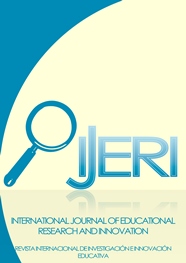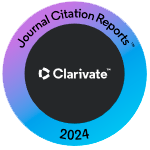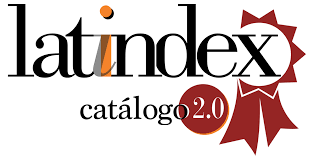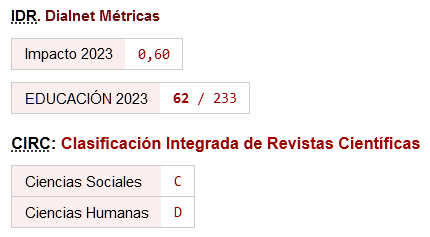COVID-19 and university learning spaces. Research trends.
DOI:
https://doi.org/10.46661/ijeri.5126Keywords:
COVID-19, learning spaces, research, higher education, teachingAbstract
COVID-19 has disrupted the lives of humans causing devastating health effects and life of a large part of the world population, affecting the social, economic and educational spheres of the planet. The scientific community is facing one of its greatest challenges to solve a global health problem such as the COVID-19 pandemic. This situation has generated an unprecedented volume of publications. The impact of COVID-19 on teaching has meant that moments of social contact have disappeared in exchange for meetings, classes, exams or virtual meetings. In this scenario, the university classrooms when reopened will not be the same, nor will their campuses or spaces in the educational field. The objective of the study was to identify scientific publications related to the effects of COVID-19 in university classrooms during the period 2019 to the present. For this, a bibliometric analysis of the scientific literature was performed. Thus, 676 documents were identified on this subject. The results of the analysis revealed that scientific productivity has increased since January 2020 with more than 650 articles on the disease, verifying the deep interest in COVID-19 in all disciplines. The main research trends include the impact of returning to the classroom with the effects on the cognitive processes, motivations and academic performance of students
Downloads
References
Abad-Segura, E., & González-Zamar, M.D. (2019a). Análisis de las competencias en la educación superior a través de Flipped Classroom. Revista Iberoamericana de Educación, 80(2), 29–45.
Abad-Segura, E., & González-Zamar, M.D. (2019b). Effects of Financial Education and Financial Literacy on Creative Entrepreneurship: A Worldwide Research. Education Sciences, 9(3), 238.
Abad-Segura, E., González-Zamar, M.D., Infante-Moro, J.C., & Ruipérez García, G. (2020). Sustainable Management of Digital Transformation in Higher Education: Global Research Trends. Sustainability, 12(5), 2107.
Abreu, J. L. (2020). Tiempos de Coronavirus: La Educación en Línea como Respuesta a la Crisis (Times of Coronavirus: Online Education in Response to the Crisis). Daena: International Journal of Good Conscience, 15(1), 1-15.
Acaso López-Bosch, M. & Megías, C. (2013). "rEDUvolution": Hacer la revolución en la educación (1a ed.). Barcelona: Paidós.
Arce-Peralta, F. J. (2020). La transición del paradigma educativo hacia nuevos escenarios: COVID-19. CienciAmérica, 9(2), 115-119.
Avello, I. Q. (2020). Covid-19 y Cierre de Universidades ¿Preparados para una Educación a Distancia de Calidad? Revista Internacional de Educación para la Justicia Social, 9(3), 1-11.
Barret, P., Davies, F., Zhang, Y. & Barrett, L. (2017). The holistic impact of classroom spaces on learning in specific subjects. Environment and behavior, 49(4), 425-451.
Baum, E. J. (2018). Learning Space Design and Classroom Behavior. International Journal of Learning, Teaching and Educational Research, 9 (17), 34-54.
Bonilla-Guachamín, J. A. (2020). Las dos caras de la educación en el COVID-19. CienciAmérica, 9(2), 89-98.
Cabero Almenara, J. (2014). Reflexiones sobre la brecha digital y la educación: siguiendo el debate. Inmanecencia, 4(2), 14-26.
Cáceres-Piñaloza, K. F. (2020). Educación virtual: Creando espacios afectivos, de convivencia y aprendizaje en tiempos de COVID-19. CienciAmérica, 9(2), 38-44.
Cortina, A., & Conill, J. (2020). Educar moralmente desde la experiencia del coronavirus. Padres y Maestros/Journal of Parents and Teachers, 382, 6-11.
Choi, G. Y., & Behm-Morawitz, E. (2018). Teach me about yourself (ie): Exploring selfie-takers’ technology usage and digital literacy skills. Psychology of Popular Media Culture, 7(3), 345.
Daniels, H., Leadbetter, J., Warmington, P., Edwards, A., Martin, D., Popova, A. & Brown, S. (2007). Learning in and for multi‐agency working. Oxford Review of Education, 33(4), 521-538.
De Vincenzi, A. (2020). Del aula presencial al aula virtual universitaria en contexto de pandemia de COVID-19. Avances de una experiencia universitaria en carreras presenciales adaptadas a la modalidad virtual. Debate Universitario, 8(16), 67-71.
Di Franco, M. G., Trainer, J. A., Bazán, S., & Porta, L. G. (2020). Concatenaciones fronterizas: pedagogías, oportunidades, mundos sensibles y COVID-19. Praxis Educativa, 24(2), 1-18.
Durieux, V., & Gevenois, P.A. (2010). Bibliometric indicators: Quality measurements of scientific publication 1. Radiology, 255, 342–351.
Echeita, G. (2020). La Pandemia del Covid-19. ¿Una Oportunidad para Pensar en Cómo Hacer más Inclusivos Nuestros Sistemas Educativos? Revista Internacional de Educación para la Justicia Social, 9(1), 7-16.
Fernández-Márquez, E., Vázquez-Cano, E., & López-Meneses, E. (2016). Los mapas conceptuales multimedia en la educación universitaria: recursos para el aprendizaje significativo. Campus Virtuales, 5(1), 10-18.
Fink, L. D. (2013). Creating significant learning experiences: An integrated approach to designing college courses. Journal of Chemical Education, 82(6), 819-819.
García, E. S. (2020). Reflexiones sobre la educación telemática en tiempos de coronavirus. Revista AOSMA, (28), 13-19.
García-García, M. D. (2020). La docencia desde el hogar. Una alternativa necesaria en tiempos del Covid 19. Polo del Conocimiento, 5(4), 304-324.
González-Zamar, M.D. & Abad-Segura, E. (2020a). El aula invertida: un desafío para la enseñanza universitaria. Virtualidad, Educación y Ciencia, 11(20), 75-91.
González-Zamar, M-D. & Abad-Segura, E. (2020b). La Realidad Aumentada como recurso creativo en la educación: una revisión global. Escuelas creativas. Creatividad y Sociedad (32), 164-190.
Gutierrez-Moreno, A. (2020). Educación en tiempos de crisis sanitaria: Pandemia y educación. Praxis, 16(1).
Hargreaves, A. (2018). Strategies, decisions and control: interaction in a middle school classroom. In Teacher decision-making in the classroom, 134-169. London: Routledge y Kegan Paul.
Hopland, A.O. & Nyhus, O.H. (2015). Does student satisfaction with school facilities affect exam results? An empirical investigation. Facilities, 33(13/14), 760-774.
Huber, G. L. (2008). Aprendizaje activo y metodologías educativas. Active learning and methods of teaching. Revista de Educación, 59, 59-81.
Hueso, L. C. (2020). La enseñanza digital en serio y el derecho a la educación en tiempos del coronavirus. Revista de educación y derecho= Education and law review, (21), 6.
IESALC-UNESCO (2020). El coronavirus-19 y la educación superior: impacto y recomendaciones. Retrieved from: https://www.iesalc.unesco.org/2020/04/02/el-coronavirus-covid-19-y-la-educacion-superior-impacto-y-recomendaciones
Imbernón Muñoz, F., Silva García, P. & Guzmán, C. (2011). Competencias en los procesos de
enseñanza-aprendizaje virtual y semipresencial. Comunicar, 18(36), 107-114.
Malaguzzi, L. (2000). La educación infantil en Reggio Emilia. Barcelona: Octaedro.
Maxwell, L. (2016). School building condition, social climate, student attendance and academic achievement: A mediation model. Journal of Environmental Psychology, 46, 206-216.
Moreno, J. L. M., v Molins, L. L. (2020). Educación y Covid-19: Colaboración de las Familias y Tareas Escolares. Revista Internacional de Educación para la Justicia Social, 9(3).
Pegado, R., Silva-Filho, E., Lima, I. N. D., & Gualdi, L. (2020). Coronavirus disease 2019 (COVID-19) in Brasil: information to physical therapists. Revista da Associação Médica Brasileira, 66(4), 498-501.
Pritchard, A. (1969). Stadistical bibliography or bibliometrics. Journal of documentation, 25(4), 348-349.
Ramírez, E. F. M. (2020). Una reflexión filosófica de la ciencia en tiempos del coronavirus. Anales de la Academia de Ciencias de Cuba, 10(2), 871.
Rodríguez, J. R., Gómez, S. L., Suelves, D. M., & Rodríguez, M. M. C. (2020). Materiales didácticos digitales y coronavirus en tiempos de confinamiento en el contexto español. Práxis Educativa, 15, 1-20.
Rodríguez, L. J. C. (2020). Efectos del coronavirus en el sistema de enseñanza: aumenta la desigualdad de oportunidades educativas en España. Revista de Sociología de la Educación-RASE, 13(2), 114-139.
Rodríguez, L. O., Díaz, M. I. C., & Pandiella, R. L. (2020). Herramientas digitales para la comunicación, la tele-docencia y la tele-orientación educativa en tiempos de COVID-19. Revista AOSMA, (28), 92-103.
Rojas, L. V., Huamán, C. J. V., & Salazar, F. M. (2020). Pandemia COVID-19: repercusiones en la educación universitaria. Odontología Sanmarquina, 23(2), 203-205.
Tranier, J. A., Bazán, S. A., Porta Vazquez, L. G., & Di Franco, M. G. (2020). Concatenaciones fronterizas: pedagogías, oportunidades, mundos sensibles y COVID-19.
Tse, H.M., Learoyd-Smith, S., Stables, A. & Daniels, H. (2015). Continuity and conflict in school design: a case study from Building Schools for the Future. Intelligent Buildings International, 7(2-3), 64-82.
Valenzuela, M. T. (2020). Coronavirus: un desafío global: Coronavirus: a global challenge. ARS MEDICA Revista de Ciencias Médicas, 45(1), 5-6.
Vázquez-Cano, E., & López-Meneses, E. (2014). Los MOOC y la educación superior: la expansión del conocimiento. Profesorado. Revista de Currículum y Formación de Profesorado, 18(1), 3-12.
Vázquez-Cano, E., López-Meneses, E., Fernández-Márquez, E., & Ballesteros-Regaña, C. (2018). Los nuevos entornos virtuales de aprendizaje permanente (MOOC) y sus posibilidades educativas en ámbitos sociales y educativos. Píxel-Bit: revista de Medios y Educación, 53, 179-192.
World Health Organization (WHO). Mental health and psychosocial considerations during the COVID-19 outbreak, 18 Abril 2020 World Health Organization. Retrieved from: https://www.who.int/es/dg/speeches/detail/who-director-general-s-opening-remarks-at-the-media-briefing-on-covid-19---11-march-2020
Yang, Z., Becerik-Gerber, B., & Mino, L. (2013). A study on student perceptions of higher education classrooms: Impact of classroom attributes on student satisfaction and performance. Building and Environment, 70, 171-188.
Zapatería, M. (2020). Entornos virtuales en tiempos de coronavirus. Question/Cuestión, 1, e290-e290.
Zarzuelo, M. Á. (2020). El confinamiento de niñas y niños en España en 2020 por la crisis del COVID-19: Propuestas desde la Educación Social Escolar para la vuelta al centro escolar. RES: Revista de Educación Social, 30, 457-461.
Downloads
Published
How to Cite
Issue
Section
License
Copyright (c) 2020 Mariana-Daniela González-Zamar, Emilio Abad-Segura, César Bernal-Bravo

This work is licensed under a Creative Commons Attribution-NonCommercial-NoDerivatives 4.0 International License.











